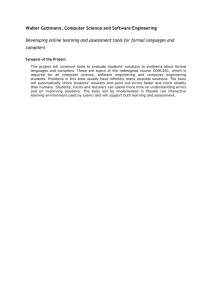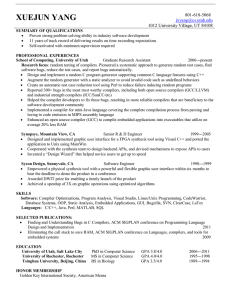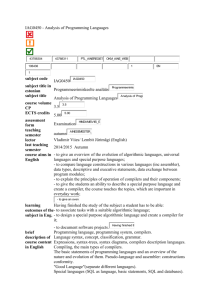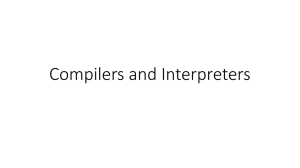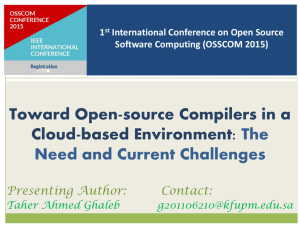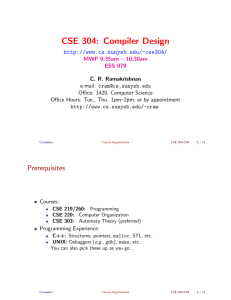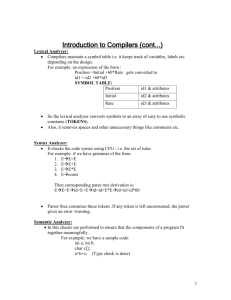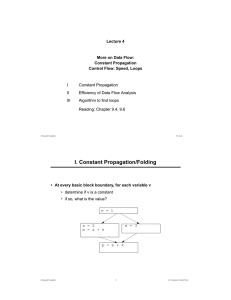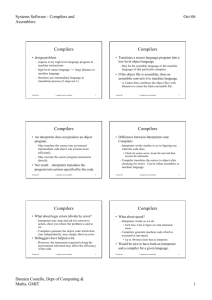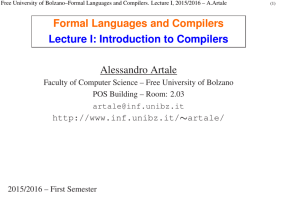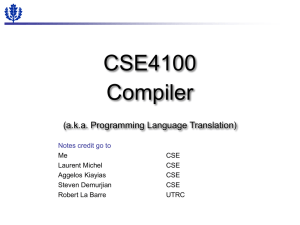Operating Systems & Compilers
advertisement
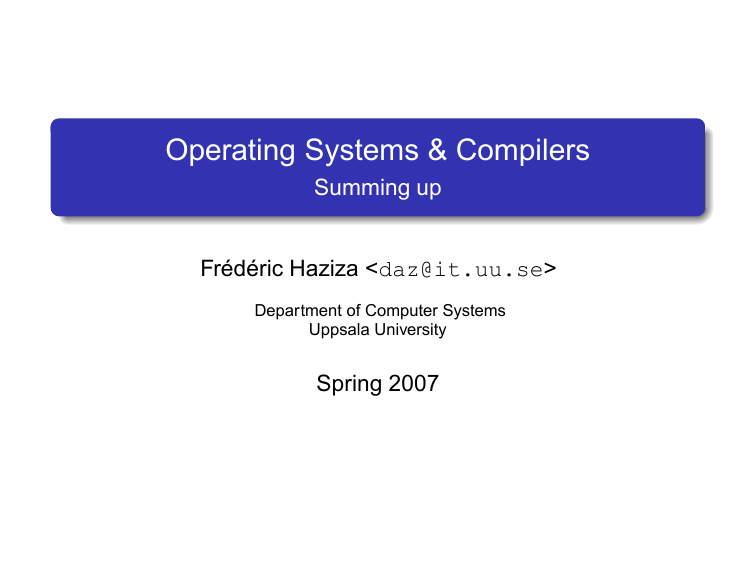
Operating Systems & Compilers Summing up Frédéric Haziza <daz@it.uu.se> Department of Computer Systems Uppsala University Spring 2007 Hans Flack A. Silberschatz, P. B. Galvin, G. Gagne. Operating System Concepts, Seventh Edition. Wiley, 2002 (ISBN: 0-471-69466-5) R. Hunter. The Essence of Compilers. Prentice-Hall, 1999 (ISBN: 0-13-727835-7) Course Homepage. http://www.it.uu.se/edu/course/homepage/oskomp/vt07. Conficius, 5th century BC I hear and I forget, I see and I remember, I do and I understand. You take your own notes 2 labs (mandatory) Those slides are no placeholders for lecture notes 4 handins (bonus) Operating Systems Compilers Providing the environment for programs to run To increase CPU utilization: multitasking 2 process schedulers Control is eventually switched back to the system through an interrupt (hardware error detection) a trap (software-generated interrupt) or a system call (interface to ask the OS to perform privileged tasks Operating Systems Process Management Resources (CPU time, memory, files, I/O) are either given at creation or allocated while running. Definition (Process) Unit of work in the system. For both user and system. Creation / Deletion of processes Suspending / Resuming process Mechanism for process synchronization Mechanism for process communication Mechanism for deadlock handling (prevention, avoidance, reparation, ...) Compilers Operating Systems Compilers ⇒ PCB, states, transitions, ready queue, device queue, context switch IPC, message passing, shared Memory, threads, responsiveness, user/kernel-threads, CPU burst cycles, preemptive vs cooperative, throughput, turnaround time, response time, waiting time, FIFO, SJF, Priority Scheduling, RR, Multi-level queues, starvation, aging, time quantum, symmetric/asymmetric processors, processor affinity, localities, semaphores, locks Deadlock: Resource Allocation Graph, Prevention, Avoidance, Detection, Recovery Operating Systems Compilers Memory Management Keeping track of which parts of memory are currently being used and by whom Which processes and data to move in and out memory Allocating and deallocating memory space as needed Operating Systems Compilers ⇒ Address binding, relocation register, linking, dynamic loading, input queue, contiguous memory, xxx-fit algorithms, fragmentation, compaction, paging Virtual memory: Paging, Segmentation, demand-paging, logical space, physical space, pages, frames, page table, frame table, Page Table Base Register, TLB, shared pages, reentrant code, lazy swapping, page-fault, page replacement algorithms, modify bit, reference string, FIFO, OPT, LRU, LRU with approximations, Belady’s anomaly, global vs local page replacement, thrashing, working-set, page-fault frequency Operating Systems Storage Management File system Disks Protection and Security ⇒ done in the essay Compilers Operating Systems Compiling Process & Lexical analysis ⇒ Analysis stage, synthesis stage, translators, efficiency, correctness, source code, machine code, intermediate representation, lexical analysis, lexer, syntax analysis, parser, semantic analysis, abstract syntax tree, regular expressions, grammars, Finite automaton Compilers Operating Systems Compilers Parsing ⇒ tokens, Context-free grammars, LL(k)/LR(k) grammars, productions, derivation, terminals/non-terminals, lookahead symbol, Parse tree, abstract syntax tree, top-down, bottom-up, recursive-descent, shift-reduce, left-factoring, parse table, left-recursion elimination Operating Systems Compilers Semantic analysis & Code Generation ⇒ scope, type, fault-tolerance, symbol table, stack/hashtable/... implementations, name collisions ⇒ three-address code, P-code, Bytecode, JVM, stack, implicit operands, CISC vs RISC, instruction selection, register allocation, liveness, graph-coloring register allocation, optimizations
